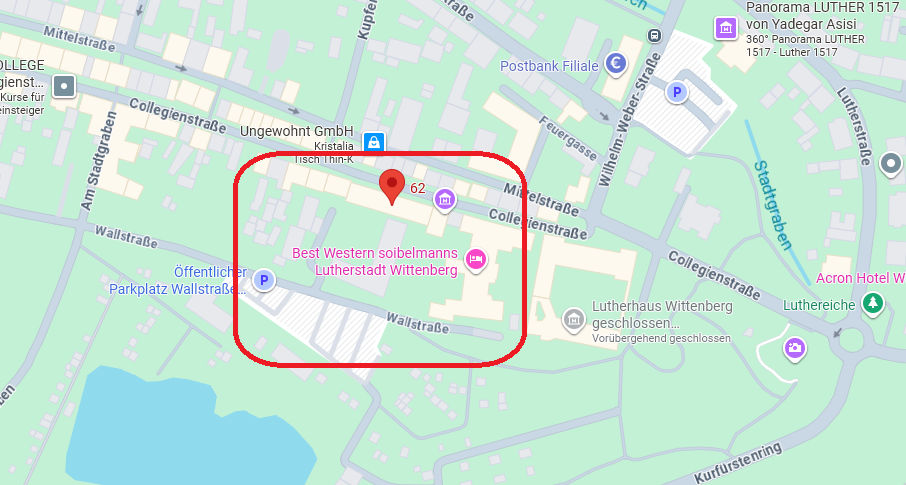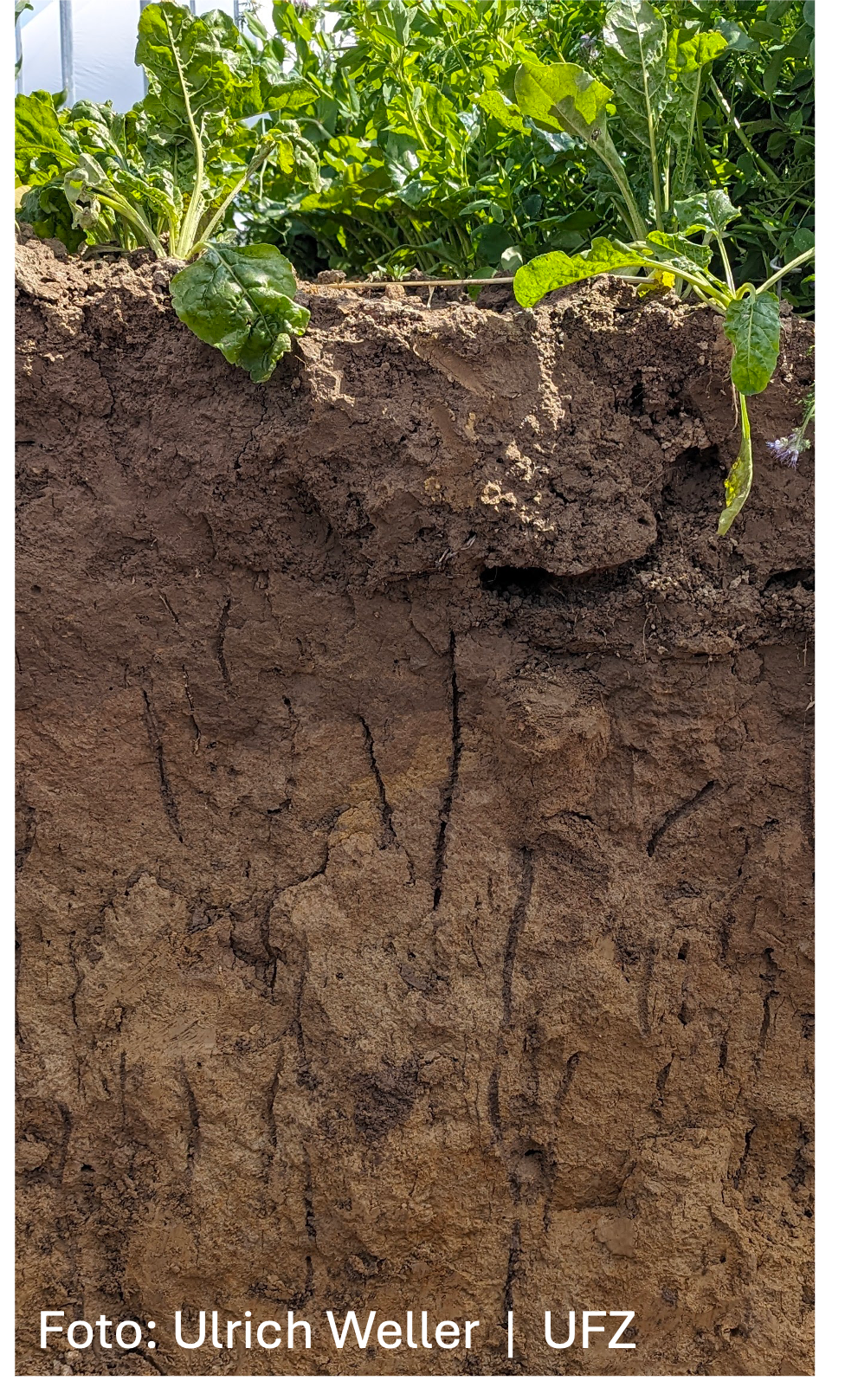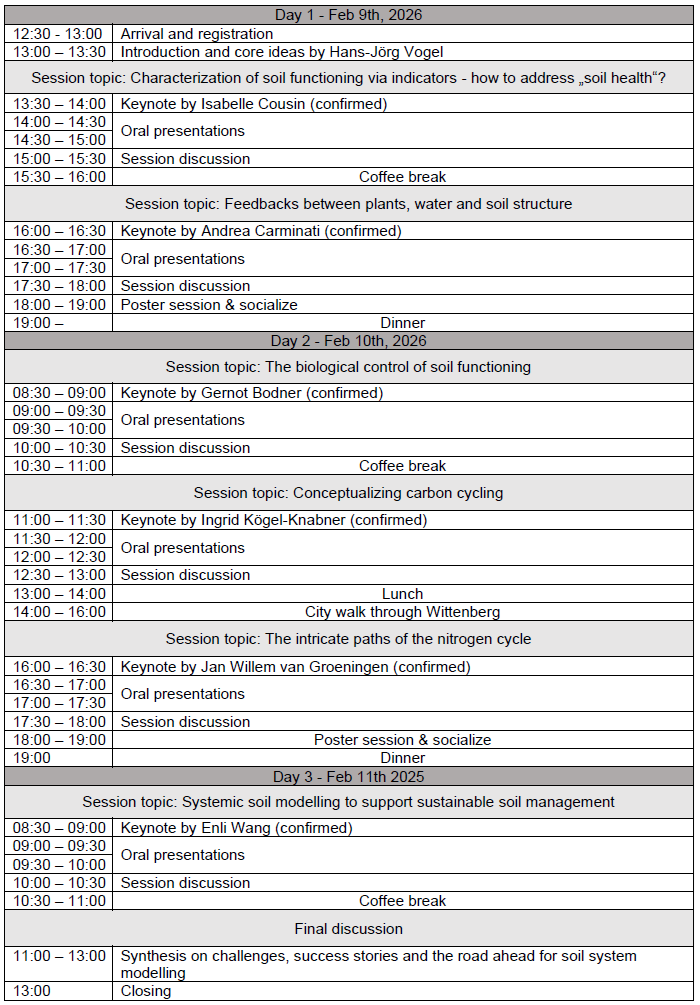Workshop
Frontiers in Soil System Science
Feb 9-11th 2026, Leucorea, Wittenberg
In recent years, soils have become a key focus in environmental research due to their central role in water and nutrient cycles and their provision of essential ecosystem functions such as biomass production, water retention, pollutant degradation, carbon storage, and nutrient cycling. Understanding these functions requires a systemic, interdisciplinary approach to capture the complex interactions of biological, chemical, and physical processes, especially in the face of climate change and varying land use. The workshop “Frontiers in Soil System Science” brings together international experts to explore future directions in soil systems research, with an emphasis on developing predictive models under data-scarce conditions. Key topics include water and matter fluxes, carbon storage, nutrient cycling, and soil-plant interactions. With a limited number of participants (max. 60), the event prioritizes in-depth discussion, synthesis, and balanced contributions from experimental and modeling perspectives. Oral contributions on guiding questions and poster presentations are welcomed.
Over the last decade, soils have increasingly become a focal point in environmental research. They play a central role in local and global water and nutrient cycles, thereby providing essential ecosystem functions and services. These include biomass production, water retention, pollutant degradation, carbon storage, nutrient cycling, and serving as a habitat for an immense diversity of organisms.
Understanding soil functions requires a systemic approach because soil is a complex dynamic system influenced by multiple interacting biological, chemical, and physical processes. A systemic perspective is crucial for addressing challenges like soil degradation, carbon sequestration, and sustainable agriculture, as it enables us to understand feedback loops, emergent properties, and long-term changes in soil systems.
It is a formidable scientific challenge to unravel the interacting processes and translate our understanding into quantitative models that can describe and predict the changes in soils and their properties in response to external forcings. The main drivers today are climate change and the management of soils across a wide range of land use intensities.
Over the last 20 years, soil research provided ample evidence that an interdisciplinary approach is essential—one that integrates the various subdisciplines of soil science, including plant and rhizosphere research, contributing to the systemic perspective required for the transformation of agricultural and food systems. Under the title "Frontiers in Soil System Science," scientists from diverse disciplines are being brought together to discuss future perspectives for a systematic study of soil functions and the development of models having predictive power for future scenarios where empirical data are scarce.
Various experts will cover key topics of soil functionality: water & matter fluxes, carbon storage, nutrient cycling and soil-plant interactions. Related keynote presentations by invited international scientists will form the backbone of the event. The presentations are geared towards the following guiding questions:
- What are the critical obstacles or difficulties for an improved understanding of soil functions with regard to their development under changing conditions?
- What are success stories in soil system science and are there new promising techniques and methodological approaches to provide deeper insights?
- Where is the optimal balance between data-driven approaches and process-based modelling?
Potential participants are invited to submit contributions on these topics and questions. The number of presentations will be kept relatively small to allow sufficient time for in-depth discussion of the topics. There will also be the opportunity to present posters.
The organization team invites the keynote speakers (all confirmed) and curates the list of invited participants in order to have balanced contributions from experimental studies, and modelling including data science. The number of participants will be limited to 60. The available slots beyond keynote speakers and invited colleagues will be filled on a first-come first serve basis. We provide ample time for reflection and discussion and motivate to initiate synthesis work in the wake of the workshop.
|
Prof. Dr. Andrea Carminati Environmental Systems Science - ETH Zürich |
|
Dr. Isabelle Cousin Info&Sols Research - INRAE |
|
Dr. Gernot Bodner Institute of Agronomy - BOKU Vienna |
|
Dr. Enli Wang Crop Modelling - CSIRO Canberra |
|
Prof. Dr. Ingrid Kögel-Knabner Soil Science - TU Munich |
|
Prof. Dr. Jan Willem van Groeningen Soil Biology - Wageningen University |
|
Prof. Dr. Kristian Thorup-Kristensen Section for Crop Sciences - University of Copenhagen |
There will be no conference fee for the workshop.
However, participants are asked to arrange and cover their own travel and accommodation expenses. A block of rooms has been reserved at LEUCOREA and the adjacent Best Western Hotel.
For bookings at the Best Western soibelmanns Lutherstadt Wittenberg Hotel, please use the following email address and refer to the keyword “UFZ”:
The room rate is €110.00 per night, including breakfast.
There is also the possibility to use the underground parking garage for €16 per day. Please note that parking spaces cannot be reserved in advance.
For guest rooms at LEUCOREA , please contact Kathrin Becker:
Single rooms are available at a rate of €40.00 per night.Breakfast must be booked separately für €9,50. Please contact cafeterialeucorea@gmx.de .
Please also mention the “UFZ event” when making your reservation.
The reserved room block is available until December 9, 2025. You will receive a confirmation for your registration to allow you to book your traveling.

The LEUCOREA is located in the south-eastern part of the centre of Wittenberg, between Collegienstraße and Wallstraße.
By Train: Lutherstadt Wittenberg is situated on the train line between Berlin and Halle/Leipzig and is also served by Inter-City Express (ICE) trains. The ICE travels to Wittenberg in 45 minutes from the central station in Berlin; travel time from Leipzig with the ICE is about 40 minutes; from Halle with train about 60 minutes; from the Halle/Leipzig (LEJ) Airport 55 minutes; from the Airport Berlin Brandenburg (BER) about 80 minutes, with a transfer at the Berlin central station. All connections operate more or less on the hour, additional connections are possible using regional transportation. From the train station in Wittenberg, the LEUCOREA Foundation can be reached by foot in about 15 minutes.
By Car: the LEUCOREA can be reached by car via the Wallstraße. The Collegienstraße is a pedestrian zone. Limited parking spaces are available to LEUCOREA visitors, on the western side of the courtyard. Public parking can be found in the Wallstraße.
Adress:
Collegienstraße 62
06886 Lutherstadt Wittenberg
Co-organisers:
- Doris Vetterlein, Helmholtz-Centre for Environmental Research – UFZ
- Sara König, Helmholtz-Centre for Environmental Research – UFZ
- Ute Wollschläger, Helmholtz-Centre for Environmental Research – UFZ
- Steffen Schlüter, Helmholtz-Centre for Environmental Research – UFZ
- Hans-Jörg Vogel, Helmholtz-Centre for Environmental Research – UFZ
Contact:
- Ute Wollschläger ute.wollschlaeger@ufz.de



